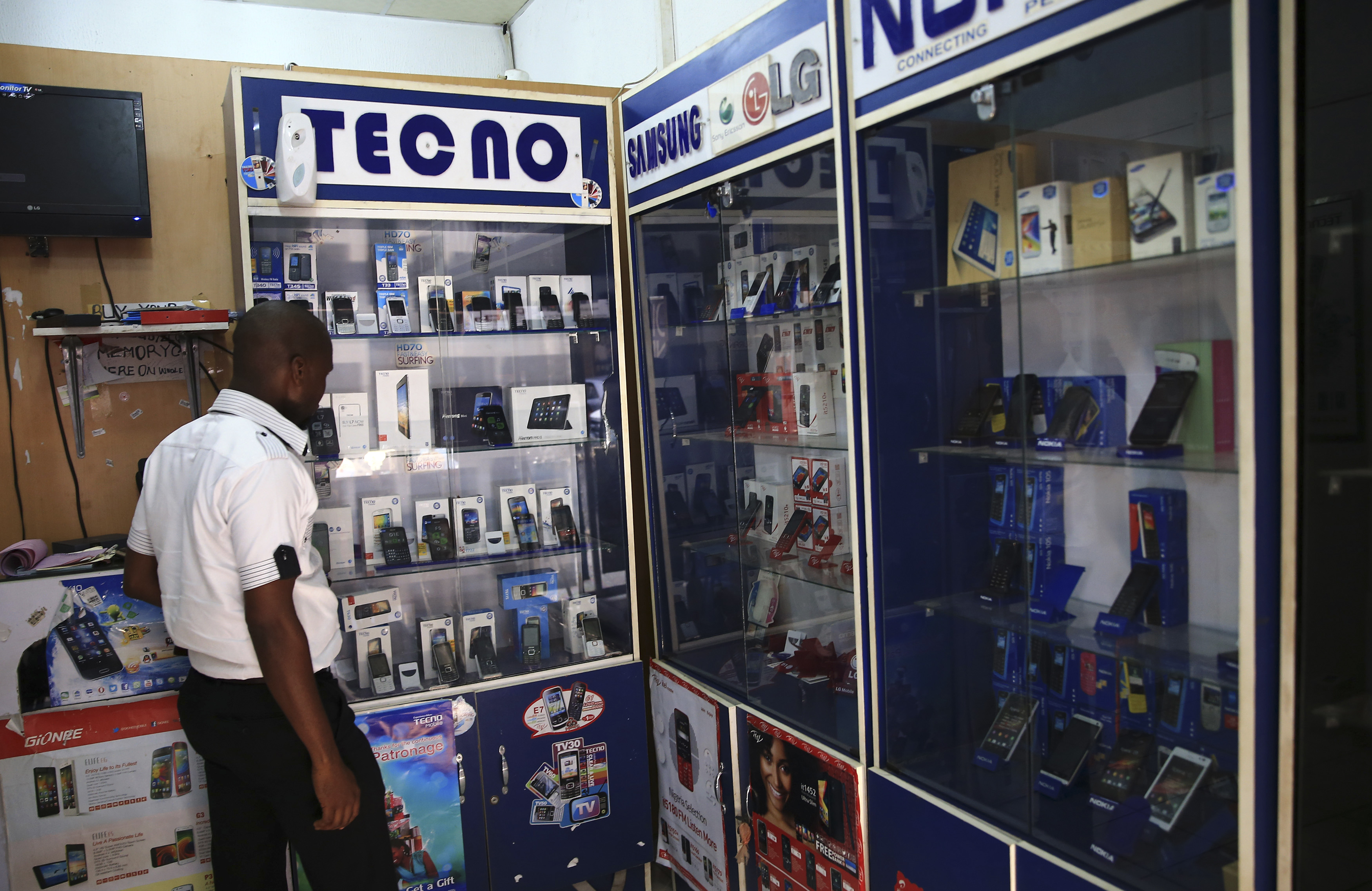
FILE – A man looks at smartphones on display at a shop at Wuse II business district in Abuja, Nigeria, Dec. 9, 2014. (Reuters)
As Nigeria’s mobile penetration continues to grow, more Nigerians are turning to smartphones and other mobile devices to get their choice of videos, entertainment and news, anytime, anywhere.
Nigerians love their videos, particularly music videos. But only one-third of their viewing time is spent on television screens. More often, they prefer to watch videos on mobile devices throughout the day and into the night – an indication that video consumption is increasing because more Nigerians are switching to smartphones, according to Ericsson’s head of TV and Media in Sub-Saharan Africa, Pierre Cloete.
The increased reliance on mobile for TV shows and videos is due primarily to limited, lackluster TV offerings, slow, unreliable Internet speeds for downloading and streaming, a shortfall of fixed broadband networks, the availability of low-end, reasonably-priced mobile phones, and evolving regulatory policies.
Ericsson’s recent TV and Media in Nigeria report found 85 percent of Nigerians watching video and television shows late at night and 73 percent watching video content in bed.
About 75 percent of smartphone owners watch videos on their phones, with 70 percent watching video content across all devices. Nigerians aged 18-24 rely on mobile to view, stream or download digital content.
That is not to say Nigeria is a fully-connected society. According to the State of Broadband 2015, a report issued by the International Telecommunications Union, only 8.5 percent of households have Internet access. None have fixed broadband access, and 11.7 percent have mobile broadband subscriptions.
Nevertheless, the country has a highly-developed mobile technology landscape.
“Nigeria has the largest amount of mobile subscribers in Africa – a new mobile subscription is activated every two seconds in Nigeria,” said Cloete in an email interview. “Mobile phones are the dominant devices in Nigeria and smartphone growth is in double-digit numbers.”
The growth in smartphone ownership and a lack of fixed broadband availability have made 2G, 3G and 4G mobile networks with data access the most popular way to connect to the Internet in Sub-Saharan Africa as a whole.
Citing OVUM statistics, Cloete said Nigeria’s 2016 smartphone penetration is projected to be around 22.83 percent or about 43.7 million smartphone subscriptions. That number is estimated to grow to 94.9 million subscriptions in 2019.
Smartphones are Nigeria’s gateway to video consumption, said Cloete, and the two are directly related against the country’s “very buoyant video landscape and high potential for video services.”
As the high interest in digital content gives birth to new, media-related start-ups, Cloete projects that Nigeria – Africa’s largest mobile market – will expand significantly in the next three years, with growth in mobile video closely related to smartphone growth.

2 responses to “Nigerians Take to Mobile for Better Media Content”
I agree there is a fast growing mobile market in Nigeria that could provide the populace with job opportunities. However, erratic power supply or none availability, couple with constant fuel scarcity are militating the development of all sectors of the national economy.
We’ve been expecting VOA to broadcat in Yoruba Language.Languages like Swahili,etc don’t have speakers than yoruba.The native speakers and country homes are spread in Nigeria,Benin Republic and Togo while sons and daughters of yoruba are in Brazil,Cuba,USA,UK,Ghana,Cote D’Ivore,etc.
BBC are almost in the business,broadcasting in Yoruba.
Yoruba is a tonal language and very tonal.Both writing and speaking reflecting its tonal nature.
Thanks-Joseph Olarewaju,
2,OLADIPO STREET GAA-AKANBI ILORIN,KWARA STATE NIGERIA
CONTACT MOBILE:+2347057709337